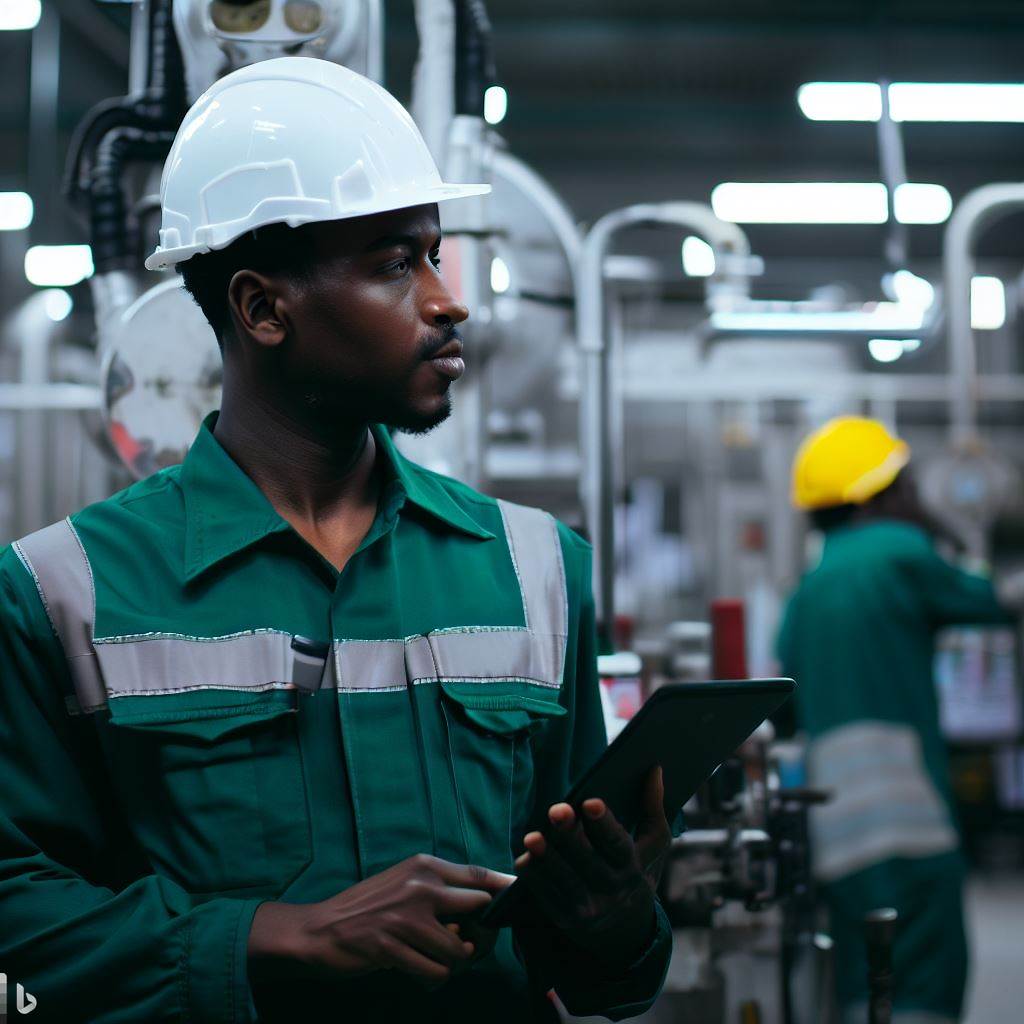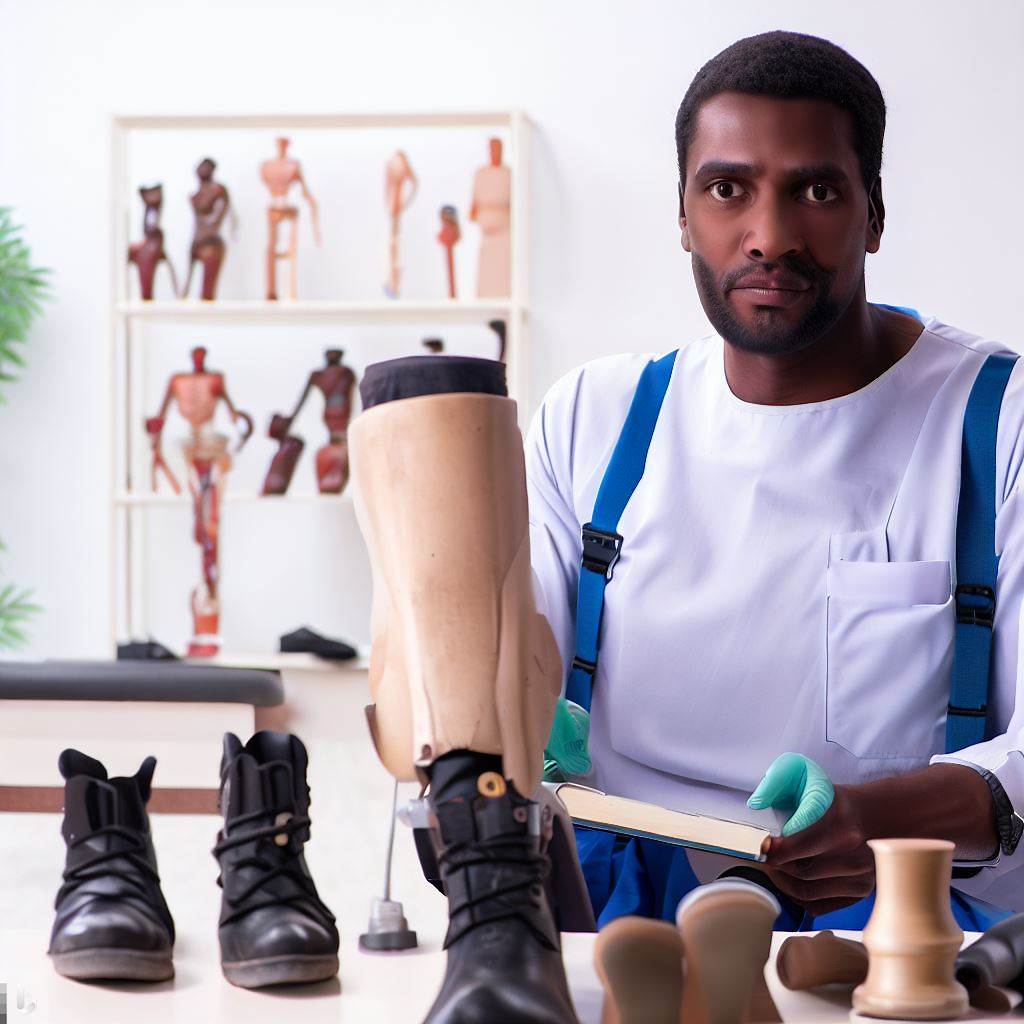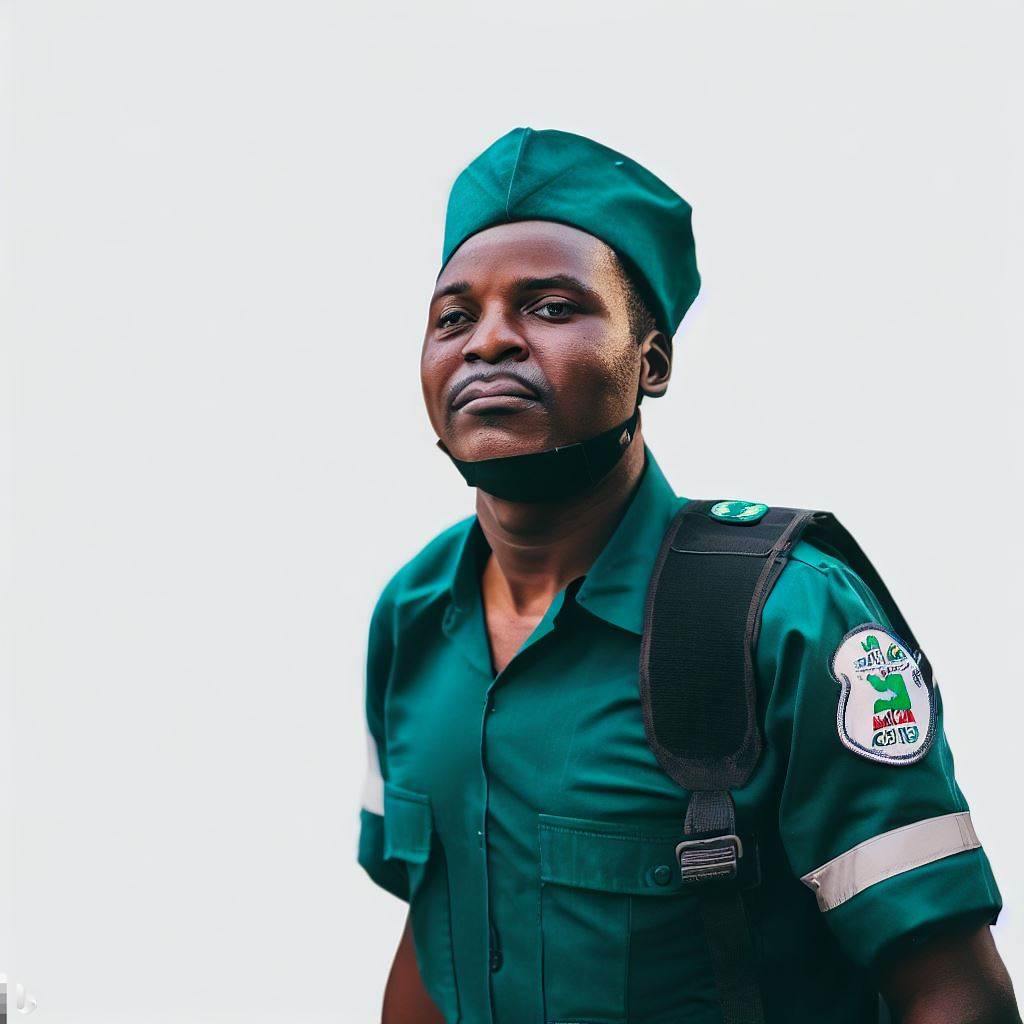Introduction
Brief Overview of Nigeria’s O&P Industry
The O&P industry in Nigeria is flourishing, serving people with disabilities. The O P Work Environment exhibits rapid growth and meets diverse needs.
This industry focuses on designing, fabricating, and fitting devices such as prosthetic limbs, orthopedic braces, and custom-made footwear.
With a rising demand for these services, Nigeria’s O&P industry is vital in improving the quality of life for people with mobility impairments.
Importance of Understanding the Work Environment
In order to excel in Nigeria’s O&P industry, it is crucial to have a comprehensive understanding of the work environment.
This knowledge allows professionals to adapt to the unique challenges and opportunities within the industry.
Understanding the work environment involves being aware of the cultural, social, and economic factors that influence the field of O&P in Nigeria.
Professionals need to recognize the importance of patient-centered care, as well as the need to collaborate with multidisciplinary teams to achieve optimal outcomes.
Additionally, having knowledge about the local healthcare system, regulations, and available resources is essential for success in Nigeria’s O&P industry.
By understanding the work environment, O&P professionals can better serve their patients, improve their clinical practice, and contribute to the growth and development of the industry.
It also enables them to identify potential areas for innovation and stay up-to-date with advancements in technology and research.
In the following sections, we will explore various aspects of Nigeria’s O&P work environment, including the challenges faced, opportunities available, and strategies for success.
By gaining insight into this dynamic sector, professionals can navigate the field more effectively and make a positive impact on the lives of people with disabilities.
Overview of Nigeria’s O&P Work Environment
Types of O&P professionals in Nigeria
- Orthotists – professionals specializing in designing, fitting, and providing orthoses for patients.
- Prosthetists – professionals specialized in the fabrication, fitting, and maintenance of prostheses for individuals.
- Orthotic and Prosthetic Technicians – skilled technicians who assist orthotists and prosthetists in the fabrication and maintenance of orthoses and prostheses.
Work settings for O&P professionals
- Hospitals: O&P professionals work in various hospitals, both public and private, providing services to patients.
- Rehabilitation Centers: These centers hire O&P professionals to assist individuals with physical disabilities in their recovery process.
- Orthotic and Prosthetic Clinics: Specialized clinics where O&P professionals offer assessment, treatment, and follow-up services.
- Mobility and Assistive Device Companies: Some O&P professionals work in companies that manufacture and supply mobility aids and assistive devices.
- Academic Institutions: O&P professionals may also work in universities and colleges, teaching and training future professionals in the field.
Key organizations in the O&P industry
- The Nigerian Orthopaedic Association (NOA) – an organization that promotes research and education in orthopaedics and related fields.
- The Orthopaedic & Prosthetic Association of Nigeria (OPAN) – a professional association that represents and supports O&P professionals in the country.
- The National Orthotics and Prosthetics Society (NOPS) – a society dedicated to advancing the practice of orthotics and prosthetics in Nigeria.
- The International Committee of the Red Cross (ICRC) – a humanitarian organization that provides support and resources for O&P services in Nigeria.
In Nigeria, orthotic and prosthetic (O&P) professionals provide specialized services. Orthotists design and fit orthoses, while prosthetists work on prostheses.
Technicians assist in fabrication and maintenance.
They work in hospitals, collaborating with medical teams. Rehabilitation centers aid individuals with disabilities. Specialized clinics offer personalized care.
Some work in mobility and assistive device companies. Academic institutions offer teaching and training.
Key organizations support the industry. The Nigerian Orthopaedic Association (NOA) promotes research and education. The Orthopaedic & Prosthetic Association of Nigeria (OPAN) advocates for professionals.
The National Orthotics and Prosthetics Society (NOPS) advances the practice. The International Committee of the Red Cross (ICRC) provides support.
Basically, Nigeria’s O&P work environment involves orthotists, prosthetists, and technicians.
They work in hospitals, rehabilitation centers, clinics, companies, and institutions. NOA, OPAN, NOPS, and ICRC drive progress in the field.
Read: Current Opportunities for Medical Lab Technicians in Nigeria
Expectations for O&P Professionals in Nigeria
Required qualifications and skills
- Possess a Bachelor’s degree in Orthotics and Prosthetics or a related field.
- Strong knowledge of anatomy, physiology, and biomechanics to provide accurate assessments.
- Proficiency in using CAD/CAM technology for designing and fabricating orthotic and prosthetic devices.
- Excellent manual dexterity and attention to detail for precise measurements and fittings.
- Good communication skills to interact effectively with patients and healthcare professionals.
Professional conduct and ethics
- Adhere to the professional code of ethics set by the Nigerian Orthotics and Prosthetics Board.
- Maintain confidentiality and respect patients’ privacy rights during consultations and treatments.
- Demonstrate empathy, compassion, and respect towards patients, treating them with dignity and sensitivity.
- Consistently prioritize the best interests of patients, ensuring the provision of high-quality care.
Knowledge of local cultural beliefs and practices
- Familiarize oneself with the diverse cultural beliefs and practices prevalent in Nigeria.
- Understand the influence of cultural factors on patients’ perception and acceptance of orthotic and prosthetic devices.
- Sensitivity to cultural preferences regarding aesthetics, religious considerations, and traditional healing methods.
- Collaborate with patients and their families to incorporate culturally appropriate solutions into treatment plans.
In Nigeria’s O&P work environment, professionals need specific qualifications and skills.
A Bachelor’s degree in Orthotics and Prosthetics or a related field is required, along with a strong understanding of anatomy, physiology, and biomechanics for accurate assessments.
Proficiency in CAD/CAM technology is crucial to design and fabricate precise orthotic and prosthetic devices. Good manual dexterity and attention to detail are necessary for precise measurements and fittings.
Effective communication skills are essential for patient interactions and collaboration with healthcare professionals.
O&P professionals must explain procedures, answer questions, and address concerns with clarity and empathy. Ethics are highly valued in the Nigerian O&P work environment.
Adhering to the professional code set by the Nigerian Orthotics and Prosthetics Board ensures ethical practice.
Respecting patient confidentiality and privacy rights is paramount during consultations and treatments.
Understanding local cultural beliefs is crucial in delivering effective O&P services in Nigeria. O&P professionals should familiarize themselves with the diverse cultural landscape of the country.
Cultural sensitivity is imperative when considering aesthetics, religious beliefs, and traditional healing methods.
Collaborating with patients and their families to incorporate culturally appropriate solutions into treatment plans enhances patient satisfaction and compliance.
By respecting and valuing cultural diversity, O&P professionals can facilitate better patient outcomes.
Meeting these expectations enables O&P professionals to provide optimal care and contribute to the field’s advancement in Nigeria.
Read: Orthotic and Prosthetic Jobs in Nigeria: Scope & Pay
Work Challenges and Resources
In the field of orthotics and prosthetics (O&P) in Nigeria, professionals face numerous challenges due to limited resources and inadequate infrastructure.
Despite these obstacles, there are also opportunities for growth and development in the industry.
Limited resources and infrastructure
One of the major challenges that O&P professionals face in Nigeria is the limited availability of resources.
This includes the scarcity of materials needed to create prosthetic and orthotic devices, as well as the lack of modern equipment and tools.
The shortage of resources hinders the ability of O&P professionals to provide high-quality services to their patients.
Without access to state-of-the-art materials and tools, it becomes challenging to create durable and functional prosthetic and orthotic devices.
Furthermore, the inadequate infrastructure in Nigeria contributes to the difficulty faced by O&P professionals.
The lack of proper healthcare facilities and clinics makes it challenging for professionals to provide their services effectively.
O&P professionals often have to work in suboptimal conditions, which can impact the quality of care they provide to patients.
Accessibility issues for patients
In addition to limited resources, O&P professionals in Nigeria also face accessibility issues for their patients.
Many patients in remote areas have limited access to healthcare facilities, making it difficult for them to receive the necessary orthotic and prosthetic care.
The lack of transportation infrastructure and the high cost of travel prevent patients from accessing O&P services.
This means that individuals who require prosthetic or orthotic devices may have to travel long distances or even relocate temporarily in order to receive the care they need.
This lack of accessibility not only poses challenges for patients but also for O&P professionals who may need to travel to remote areas to provide their services.
It increases the logistical difficulties and costs associated with reaching patients in need, limiting the overall impact that professionals can have in improving the lives of individuals with limb differences or disabilities.
Read: Occupational Therapy Schools: Where to Study in Nigeria
Availability of training and professional development opportunities
While O&P professionals in Nigeria face challenges, there are also opportunities for growth and development.
The availability of training and professional development opportunities plays a crucial role in advancing the skills and knowledge of O&P professionals in Nigeria.
Continuing education programs, workshops, and conferences provide O&P professionals with the chance to enhance their expertise and stay updated with the latest advancements in the field.
These opportunities allow professionals to improve their understanding of innovative technologies and treatment techniques, ultimately benefiting their patients.
Furthermore, collaborations and partnerships with international organizations and experts enable Nigerian O&P professionals to gain exposure to global best practices.
These partnerships not only enhance the professional development of O&P practitioners but also strengthen the overall healthcare system in Nigeria.
In conclusion, the work environment for O&P professionals in Nigeria is characterized by challenges related to limited resources and infrastructure, as well as accessibility issues for patients.
However, the availability of training and professional development opportunities offers hope for improvement and growth within the industry.
Read: Understanding the Salary Scale for Nursing Assistants in Nigeria

Career Opportunities and Growth
Demand for O&P professionals in Nigeria
The field of orthotics and prosthetics (O&P) is in high demand in Nigeria. Due to the prevalence of musculoskeletal conditions and amputations caused by accidents and diseases.
This creates a significant need for professionals who can provide O&P services. O&P professionals play a crucial role in improving the quality of life for individuals with disabilities.
With the increasing population and urbanization in Nigeria, the demand for O&P professionals is expected to rise.
Potential career paths
O&P professionals in Nigeria have a variety of career paths to choose from. They can work in hospitals, rehabilitation centers, or private practices.
Some may specialize in specific areas such as pediatric orthotics or prosthetics for athletes.
Others may work in research and development to enhance O&P technologies. There are also opportunities to become educators or trainers in O&P programs.
Advancement opportunities
O&P professionals in Nigeria have excellent advancement opportunities within their career. By gaining experience and expertise, they can move into leadership positions.
This includes becoming department heads or directors in hospitals or rehabilitation centers. O&P professionals who have entrepreneurial skills may start their own O&P clinics or businesses.
Additionally, continuing education and staying updated with the latest advancements in O&P can lead to career growth.
Overall, Nigeria offers promising career opportunities and growth in the field of orthotics and prosthetics.
The demand for O&P professionals is high due to the prevalence of musculoskeletal conditions and amputations in the country.
O&P professionals can choose from various career paths, including working in hospitals, rehabilitation centers, or private practices.
Specializations in pediatric orthotics or prosthetics for athletes are also possible.
Advancement opportunities exist for O&P professionals to move into leadership positions and even start their own clinics or businesses.
Continuous learning through education and staying updated with advancements in the field contribute to career growth.
As Nigeria’s population and urbanization continue to increase, the demand for O&P professionals is expected to rise further, making it an excellent career choice for individuals interested in making a positive impact on the lives of people with disabilities.
Read: Life of an Orthotist/Prosthetist in Nigeria Revealed
Workplace Culture and Networking
Importance of Building Professional Relationships
In Nigeria’s O&P work environment, building professional relationships is crucial for success. Networking allows you to connect with industry experts, potential employers, and clients.
Strong professional relationships can lead to valuable collaborations and career growth opportunities. By building a network, you gain access to knowledge, resources, and support that can enhance your work.
Networking also helps in gaining insights into industry trends and developments, staying updated with new techniques.
Work-life Balance Considerations
When working in Nigeria’s O&P industry, achieving work-life balance can be challenging but essential. The demanding nature of the work can often require long hours and intense dedication.
However, it is crucial to set boundaries and prioritize self-care to avoid burnout and maintain overall well-being.
Effective time management and delegation of tasks can help in achieving work-life balance. Employers and employees need to support each other in maintaining a healthy work-life balance.
Supportive O&P Community and Associations
Nigeria’s O&P industry has a supportive community and several professional associations. These associations provide a platform for networking, collaboration, and continuous professional development.
Being a part of these associations allows you to connect with like-minded professionals who share similar challenges and experiences.
They offer resources, training programs, workshops, and conferences that can enhance your skills and knowledge.
Being actively involved in these associations can also help in staying updated with industry regulations and standards.
In general, Nigeria’s O&P work environment emphasizes the importance of building professional relationships.
Publish Your Professional Profile, Business or Brand
Showcase your expertise, gain trust, and boost visibility instantly on Professions.ng.
Publish NowNetworking is vital for growth and success in the industry, providing access to valuable support and opportunities.
However, achieving work-life balance is also crucial to maintain overall well-being in this demanding field.
Lastly, being a part of Nigeria’s supportive O&P community and associations can enhance your professional development.
By actively engaging with these resources, you can stay updated and connect with fellow professionals in the industry.
Read: How to Become a Medical Lab Technician in Nigeria
Tips for Success in Nigeria’s O&P Work Environment
Embrace cultural diversity and sensitivity
- Respect and appreciate the different cultures and backgrounds of your colleagues and clients.
- Be open-minded and willing to learn from others who may have different perspectives.
- Develop cultural sensitivity to avoid unintentionally offending or miscommunicating with others.
- Build relationships based on trust, understanding, and mutual respect.
- Embrace diversity as a valuable asset that contributes to creativity and innovation in the workplace.
Continuous learning and adaptation
- Stay updated on the latest advancements, techniques, and technologies in the O&P field.
- Be proactive in seeking training and professional development opportunities.
- Adapt to changes, new methodologies, and emerging trends in the industry.
- Continuously improve your skills and knowledge to stay competitive in the workplace.
- Be willing to step out of your comfort zone and embrace new challenges.
Seek mentorship and collaboration opportunities
- Find experienced professionals in the O&P field who can guide and support your career growth.
- Develop a strong network of mentors who can provide valuable insights and advice.
- Collaborate with colleagues to leverage collective knowledge and expertise.
- Engage in interdisciplinary collaboration to broaden your understanding and improve patient outcomes.
- Share your knowledge and expertise with others to create a culture of collaboration and continuous learning.
In Nigeria’s O&P work environment, success relies on embracing cultural diversity and sensitivity. Respecting and appreciating different cultures and backgrounds is crucial for building positive relationships.
By being open-minded and willing to learn from others, you can gain valuable insights and broaden your perspective.
Cultural sensitivity is another important aspect to consider. Developing an understanding and awareness of cultural nuances can help avoid misunderstandings and miscommunication.
Building relationships based on trust, understanding, and mutual respect is essential for effective collaboration and teamwork.
Continuous learning and adaptation are vital for success in Nigeria’s O&P work environment. Stay updated on the latest advancements, techniques, and technologies in the field.
Seek out training and professional development opportunities to enhance your skills and knowledge. Adapt to changes and embrace new methodologies to remain competitive and provide the best possible care for your patients.
Seeking mentorship and collaboration opportunities is also key. Find experienced professionals who can guide and support your career growth.
Develop a network of mentors who can provide valuable insights and advice. Collaborate with colleagues to leverage collective knowledge and expertise.
Engage in interdisciplinary collaboration to improve patient outcomes. By sharing your knowledge and expertise with others, you contribute to a culture of collaboration and continuous learning.
In short, success in Nigeria’s O&P work environment requires embracing cultural diversity and sensitivity, continuous learning and adaptation, and seeking mentorship and collaboration opportunities.
By following these tips, you can thrive in this dynamic and rewarding field.
Discover More: Ethical Standards for Family Therapists in Nigeria
Conclusion
Recap of main points discussed
Throughout this blog post, we have explored Nigeria’s O&P work environment and what to expect.
We discussed the demand for prosthetic and orthotic services in Nigeria, the challenges faced by practitioners, and the importance of cultural sensitivity in providing quality care.
Encouragement to explore Nigeria’s O&P work environment
If you are interested in working in the field of prosthetics and orthotics, Nigeria’s O&P work environment offers unique opportunities for growth and learning.
By immersing yourself in the rich Nigerian culture, you can develop a deeper understanding of the needs and challenges faced by the local population, while also making a meaningful impact in improving their quality of life.
Closing thoughts or call to action
In summary, Nigeria’s O&P work environment may present challenges, but it also offers immense potential for personal and professional growth.
By embracing the diversity and complexities of this work environment, you can contribute to the development of innovative and culturally sensitive solutions in the field.
So, don’t hesitate to explore and seize the opportunities that Nigeria’s O&P work environment has to offer.




